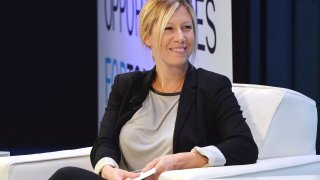
You might think cybersecurity is too complicated or boring to worry about. This year's best business book wants to convince you otherwise.
The Financial Times and consulting firm McKinsey & Company recently announced their Business Book of the Year for 2021: "This Is How They Tell Me the World Ends," by journalist Nicole Perlroth, published in February by Bloomsbury. The book delves into the frightening world of cyber attacks, and the increasingly sophisticated hackers who perpetrate them.
"The world has largely ignored the realities and profound implications of the arms race between hackers, cybercriminals and businesses and national governments," said Magnus Tyreman, McKinsey's managing partner Europe, during a livestreamed award ceremony in London on Wednesday.
The book, which the Financial Times calls a "sobering investigation into the cyber weapons arms race," dissects hackers' abilities to launch attacks that cost companies of all sizes billions of dollars, steal valuable and confidential data from governments, shut down power grids or just spy on your smartphone.
Get Tri-state area news and weather forecasts to your inbox. Sign up for NBC New York newsletters.
Even the average person faces grave risk on a daily basis, Perlroth writes: When hackers find backdoors in the the data of major corporations, your bank accounts and health records could be exposed. "That same access could be exploited for much darker forces too," she writes.
Perlroth's book also looks at some of the biggest cyber attacks in recent years, including last year's massive SolarWinds hack that gave Russian-linked hackers access to huge amounts of sensitive data from the U.S. government and major companies like Microsoft and Intel.
Ironically, it argues that the same U.S. government could be partially to blame for creating a world where cyber attacks are increasingly prevalent, starting with the Obama administration's alleged use of a military-grade computer worm to sabotage an Iranian nuclear facility in 2010.
Money Report
At the ceremony, Perlroth said she hopes the award can help shine "a glimmer of light on the highly secretive and largely invisible cyber weapons industry so that we . . . may have some of the necessary conversations now, before it is too late."
Perlroth herself may become part of those conversations: On Wednesday, she was named to the U.S. Cybersecurity and Infrastructure Security Agency's first ever Cybersecurity Advisory Committee. She'll also take home roughly $40,000 from the Financial Times and McKinsey, as part of the award.
This year's panel of award judges included Financial Times editor Roula Khalaf, Allianz chief economic advisor Mohamed El-Erian and Mozilla CEO Mitchell Baker, among others. Perlroth's book beat out five other finalists:
- "The World for Sale," Javier Blas and Jack Farchy's book on commodities traders
- Patrick Radden Keefe's "Empire of Pain," which looks at the history of Purdue Pharma and the role of the Sackler family in the opioid epidemic
- "The Conversation," by Robert Livingston, who explores how conversations about race at work can effect social change
- Michael E. Mann's "The New Climate War," which offers solutions for corporations to tackle climate change
- "The Aristocracy of Talent," by Adrian Wooldridge, which explores the idea of, and backlash against, meritocracy in the workplace
Last year's award went to Sarah Frier's "No Filter," which delved into the rise of Instagram, as both a business and part of social media's influence on modern culture.
Sign up now: Get smarter about your money and career with our weekly newsletter
Don't miss:
Bill Gates has 5 book recommendations for your 2021 holiday season
The 4 business books everyone should read, according to this former Starbucks executive






